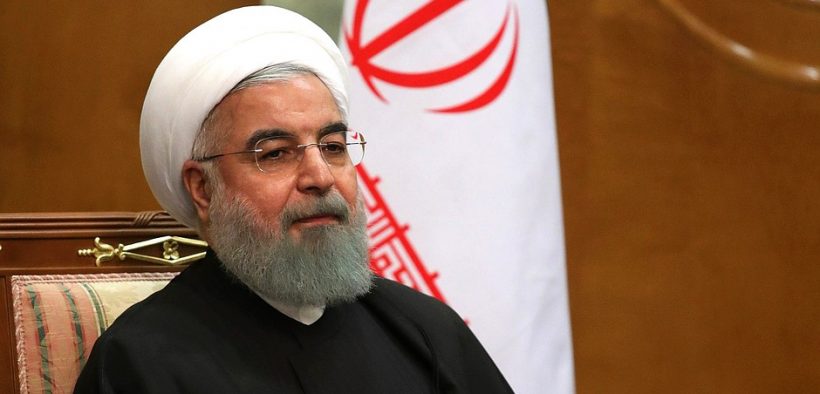Iran Officially Terminates Multiple Commitments in Iran Nuclear Deal

“This is not a military confrontation because no war is to happen. We don’t seek a war, nor do they. They know a war wouldn’t be beneficial for them.”
Iran has finally officially halted several commitments of the Joint Comprehensive Plan of Action, known commonly as the Iran Nuclear Deal or Iran Deal, which was first signed in July of 2015.
According to Reuters, last week, Iran told China, Russia, the U.K., Germany and France about deciding to terminate some of the obligations in the nuclear pact – a decision that comes a year after the U.S. withdrew from the deal and re-imposed sanctions on Iran.
President Donald Trump called the nuclear pact the most embarrassing deal signed during the Barack Obama presidency. Trump argued that the agreement was not adequate in forcing Iran to stop its nuclear programs.
However, Iran’s move is not yet seen as a violation of the deal. Iran had warned that unless the deal’s signatories protect Iran’s economy from the U.S. embargo, Tehran would start enriching uranium at a higher level.
“The (nuclear deal) is becoming meaningless because of the U.S.,” said Hamid Baeidinejad, the Iranian ambassador to the U.K, noting that Iran gave the three Western European signatories to the deal – the United Kingdom, Germany and France – 60 days to “salvage” it.
Which Obligations Has Iran Ceased?
One of the Iran Deal’s obligations was for Iran to limit low-enriched uranium production to 300 kg. Also under the agreement, Iran was allowed to enhance uranium at 3.67 percent, far below the adequate level used for weaponry production (90 percent).
Before the nuclear deal took effect, Iran’s uranium enrichment stood at 20 percent.
Another commitment was to restrict heavy water production to a maximum amount of 130 tons. Heavy water contains H-2 isotopes which are used in some types of nuclear reactors.
But now, as Reuters reported, an Iranian official said that by terminating the commitments, Iran no longer has limits on producing enriched uranium and heavy water.
EU Reactions
The European Union and the foreign ministers of France, the U.K. and Germany said that they were still committed to the nuclear deal, but will not accept Tehran’s ultimatum.
Federica Mogherini, the High Representative of the European Union for Foreign Affairs and Security Policy, confirmed that the EU still fully supports the Iran Nuclear Deal, hoping that all parties, especially the conflicting ones, will avoid further escalation.
“We always encourage dialogue. We still invite Iran to comply with all its nuclear commitments, and we will do our part on our side to continue to implement the nuclear deal fully,” said the female diplomat, as Al Jazeera quoted.
U.S. Secretary of State Mike Pompeo made a brief visit to Brussels to discuss the Iran deal secretly with Mogherini. She stated that the former CIA boss fully understood and listened carefully to the 28-nation bloc, adding that what Washington could do is take maximum restraint.
Germany’s Foreign Minister, Heiko Maas, said that the Merkel administration still considers the 2015 nuclear deal as a basis for Iran to continue to restrict its nuclear program and called the agreement vital to the world’s security.
“We are concerned about the development and the tensions in the region, that we do not want there to be a military escalation,” Maas said.
While the U.K. Foreign Secretary Jeremy Hunt warned that the heated tension between the U.S. and Iran could trigger armed conflict, Hunt’s French counterpart, Jean-Yves Le Drian, criticized Washington’s move to re-impose sanctions on Iran for not being the correct decision.
Both the US and Iran Say They Don’t Want War
Last week the Pentagon deployed an aircraft carrier and nuclear-capable jet bombers to the Middle East, an act the U.S. claimed was warranted due to an increasing Iranian threat.
A British General in the U.S.-backed coalition fighting the Islamic State, however, disputed that remark and said Iran has posed no increased threat.
“No, there’s been no increased threat from Iranian-backed forces in Iraq and Syria,” said Major General Chris Ghika.
Previously, Iran’s Supreme Leader Ayatollah Ali Khamenei stated that there would be no war with the U.S., despite the escalating tension. Khamenei said the tension between both countries was seen as a test of willpowers, not a military confrontation.
“Iranian nation’s definite option is resistance against the U.S., and in this confrontation, U.S. will have to withdraw. This is not a military confrontation because no war is to happen. We don’t seek a war, nor do they. They know a war wouldn’t be beneficial for them,” Khamenei tweeted.
Pompeo also shared similar thoughts during a trip to Moscow, saying that the U.S. is not willing to wage war with the Islamic nation.
“We have also made clear to the Iranians that if American interests are attacked, we will most certainly respond in an appropriate fashion,” Pompeo said.
Has Trump Made a Grave Calculation Error?
According to Hamid Baeidinejad, the Iranian ambassador to the U.K, by deploying B-52s, aircraft carriers and military personnel to the Persian Gulf to anticipate an uncertain threat from Iran, the Trump administration has made a grave mistake.
“We are prepared for any eventuality, this I can tell you,” Baeidinejad said.
The ambassador also denied that Iran and its proxies were behind an attack on oil tankers owned by Saudi Arabia, Norway and the UAE on Tuesday, something Washington calls an act of “sabotage.”
The Trump administration claimed that it has obtained specific and credible intelligence indicating that Iran or its regional allies were possibly preparing attacks on U.S. troops or targets in the Middle East.
But details of the source are vague and the U.S. has offered no proof. Several reputed Iran experts raised concern that some aggressive figures are looking for a pretext for a military confrontation with Iran, as if Iran were dangerous and ready for a war.













